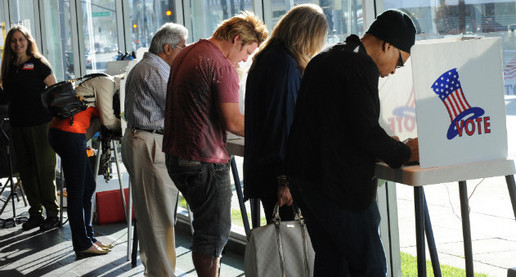






Maryland Voters Approve Casino Table Games ExpansionRhode Island Casino Can Now Offer Pit Games and Poker |
|
|

A lot more than the Presidency was decided on Tuesday night. Two states, Washington and Colorado, approved the regulation and recreational use of marijuana and another two states, Maryland and Maine, both approved measures to allow for same-sex marriage.
Tuesday was also a big night for the casino industry. A total of four different states had gambling-related issues on their November ballots. Here’s a look at the results after the voters had their say.
Maryland
 The biggest gambling-related news of the night came from Maryland, which was looking to add a sixth casino and approve table games expansion for casinos throughout the state.
The biggest gambling-related news of the night came from Maryland, which was looking to add a sixth casino and approve table games expansion for casinos throughout the state.
More than $90 million was spent in campaigning by parties on both sides of the issue, which include various casino corporations and residents looking for job creation. That’s more than was spent by the candidates for state governor, attorney general and comptroller combined.
A total of 1,266,673 votes were cast in favor of gambling expansion, making up roughly 52 percent of the vote and allowing the measure to pass. The previous casino industry that consisted of mostly slot parlors can now expand to include table games, otherwise known as pit games, as well as poker.
Additionally, a new casino has been approved for Prince George’s County, which stands at National Harbor and will benefit from Washington D.C. area gamblers. MGM Resorts International, which lobbied hard for the measure, is the current front-runner for the gaming license and has already developed plans for an $800 million resort.
Caesars Entertainment, which will open a casino in Baltimore in 2014, also pushed hard for legislation to pass, thanks to tables games expansion and a proposed tax break for casinos affected by the increase in competition.
The biggest loser on the night was Penn National Gaming, which owns and operates the Charles Town Casino in nearby West Virginia and is reliant on Washington D.C. patrons.
Rhode Island
 It was a day of mixed results in Rhode Island, which was looking to allow for table games expansion at two existing gambling facilities, the Twin River Casino in Lincoln and the Newport Grand Casino in Newport.
It was a day of mixed results in Rhode Island, which was looking to allow for table games expansion at two existing gambling facilities, the Twin River Casino in Lincoln and the Newport Grand Casino in Newport.
Supporters of the measures were hoping that by offering Las Vegas-style gambling, the state could stave off the coming competition in Massachusetts, which is just a few years away from offering casinos of their own.
Both measures were approved statewide by an overwhelming margin of more than 2 to 1, but each required local county approval. While Lincoln voters had no problem approving a plan to allow the Twin River Casino to expand its gambling options, 54 percent of local residents in Newport rejected a similar measure for the Newport Grand Casino.
Oregon
Among the nine measures on their ballot, the state of Oregon asked its voters whether or not privatized casinos and a new property near Portland should be approved.
Though the exact results are not yet known, it has become clear that neither piece of legislation would pass. Preliminary polling showed that Oregon voters had no interest in casino expansion, causing the two Canadian companies and two businessmen from Lake Oswego to almost entirely abandon their campaign.
The failure to pass these measures will go down as a victory to the nine neighboring tribal casinos who undoubtedly did not want to see their businesses suffer due to an increase in competition. Two years ago, a similar measure was also rejected by Oregon voters.
Ohio
An Ohio measure that would have added a fifth casino in the city of Youngstown was not added to the November ballot, because developers Rick Lertzman and Brad Pressman failed to acquire the 385,247 signatures of support.
The campaign for the fifth property can, however, continue and be added in time for the Spring primary of 2013. Ohio’s first casino opened in Cleveland last May and was followed by properties in Toledo and Columbus. The fourth, in Cincinnati, will open next year.
